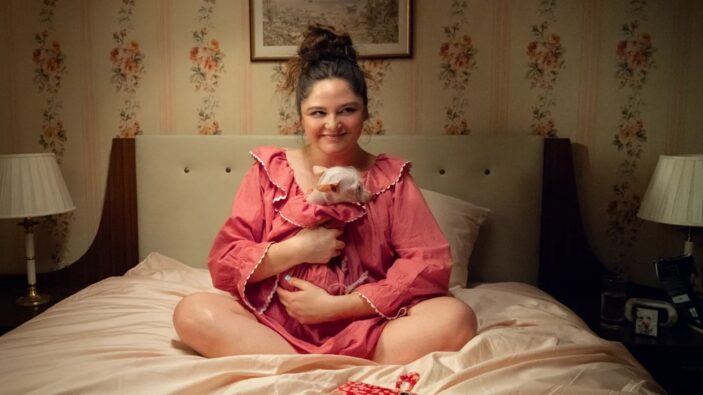

Despite the fact that the recent Materialists has been rightfully acclaimed and turned a neat little profit for its US distributor, A24, you’d be forgiven for thinking that the Dakota Johnson-led rom-com-dram was one of the worst films to ever grace the screens for the hoards of millennials who were disappointed that it was more rom-dram than rom-com. Yes, Materialists may have been advertised in a manner that highlighted its more romantic and comedic elements, but “worst film ever” – as I have seen some spectacular takes claiming such – is a mass stretch for a film that merely misled you with its advertising. Step back from your expectation and you’ll note that Materialists is spectacularly crafted by Celine Song.
I only mention that film because I can see many viewers entering Netflix’s new 10-episode series Too Much with similar expectations. Despite the fact that it’s created by Lena Dunham, whose previous effort, Girls, should give you an indication that this won’t be all mushy romance, Too Much is sure to lure audiences in with its promise of romance and comedic delight at the hands of lead Megan Stalter. And, indeed, it is both romantic and very funny, but it’s more than generic escapism. It’s tender, relatable, tragic, and a little too real. It’s quite beautifully candid, and if it isn’t what you are expecting, I implore viewers to not let that take away from its many positives.
One of the series’ main positives is that of Stalter, who leads the charge as Jessica, a 30-something New Yorker, who has lost all sense of herself in the wake of breaking up with Zev (Michael Zegen), a character in the running for most unlikeable of 2025, who has kept the apartment the two once shared, shacking up with knitting influencer (ugh!) girlfriend Wendy Jones (Emily Ratajkowski) in the process. At the end of the first episode, Jess has been through it, and it’s recommended she take take an advertising producer position in London (after all, she loves the city, having seen the Spiceworld movie nine times), hoping that her energy and sparkle returns.
She can leave her country but not her chaos, and as much as she envisions her London lifestyle to mimic the romantic comedies she idolises (the series quite cleverly titles each episode after a classic genre feature, with a slight twist – think “To Doubt a Boy”, “Notting Kill” and “Terms of Resentment”, for example), the reality is far harsher. More prison than penthouse, her London flat doesn’t scream “invitation”, but an optimist – well, in some circumstances – Jess flits off to a local pub and meets musician Felix (Will Sharpe), where their meet-cute suggests she will get her own Mr. Darcy.
Again, Dunham’s show – inspired by her own courtship with British musician beau Luis Felber – isn’t that simplistic, with Jess and Felix’s dynamic quickly being established as the type of messy, far-from-perfect back-and-forth that many viewers (especially those in long term relationships) will see their way into. The fact that Too Much – which is something Jess is referred to by Felix, in a supremely endearing way, mind you – doesn’t submit to the saccharine romantic comedy mentality makes it all the more compelling to watch. Even if it’s wildly uncomfortable at times; for starters, the sex scenes between Stalter and Sharpe are suitably realistic and serve as a sobering reminder as to how much this is not cut of the Tom Hanks and Meg Ryan cloth.
That’s not to say Too Much never has fun with its genre flirtings, with Jess’s family – Rita Wilson as her mother, Lois, Dunham as struggling sister Nora, and Rhea Perlman as opinionated grandmother Dottie – feeling very much like the effective comedy support collective, as well as its share of situational farce (a dinner party gone wrong hosted by Richard E. Grant and Naomi Watts is wildly fun, until it isn’t), but, overall, it’s looking at Jess and Felix’s travels and how no romantic journey is perfect – as much as you will it to be.
After serving as respective breakouts on both Hacks and The White Lotus, it’s an absolute treat to see Stalter and Sharpe lead their own multi-faceted vehicle here, with both leaning into the comedic and dramatic inclinations they showcased, but then able to push the boundaries of their characters further, unafraid to be as messy and frustrating as they are warm and heroic. Too Much may be just that for some viewers, others it’ll be not enough, for the hopeful many, it’ll be just right, but however one views Dunham’s dramedy, it should be applauded for its realism in a climate where picture perfect image and relationship status is unfairly deemed the standard.
![]()
![]()
![]()
![]()
![]()
![]()
![]()
![]()
![]()
![]()
FOUR STARS (OUT OF FIVE)
All 10 episodes of Too Much are now available to stream on Netflix.
*Image credit: Netflix / Ana Blumenkron
